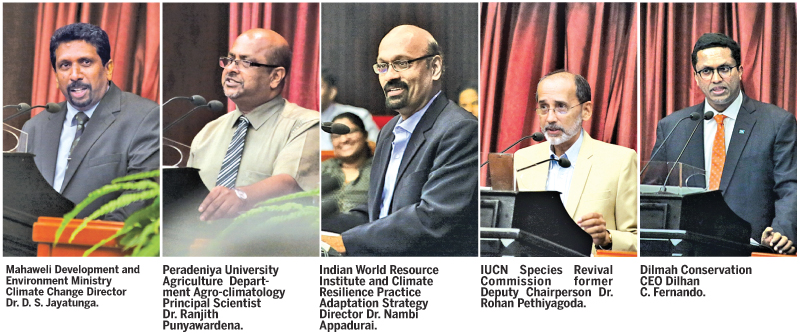National and international experts initiated a dialogue titled ‘Climate Reality – Threats, Responses and Opportunities in a Changing World’ during an inaugural forum initiated by Dilmah Conservation, together with Global Compact Network Sri Lanka, Biodiversity Sri Lanka and Citra Innovations Lab, at the BMICH in Colombo, recently.
 The forum brought in like-minded individuals from the government, private and academic sectors, for an open discussion on the alarming aspects presented by climate change, as well as to find new solutions by merging collective capacities of entrepreneurial and start-up networks engaged in climate change adaptation and innovation.
The forum brought in like-minded individuals from the government, private and academic sectors, for an open discussion on the alarming aspects presented by climate change, as well as to find new solutions by merging collective capacities of entrepreneurial and start-up networks engaged in climate change adaptation and innovation.
Dilmah Conservation CEO and United National Global Compact Network Sri Lanka Chair Dilhan C. Fernando said, “Human existence is intricately and irrevocably linked to our natural environment: we are all environmentalists by necessity. Our focus today is on the future, as there are grounds for guarded optimism.”
“The increase in development and adoption of sustainable technologies, climate-smart agriculture and knowledge of how we might adapt to the new reality in our world, has been unprecedented during the past decade.
“It is evident today, that there is far greater potential and opportunity in climate-smart agriculture, production and lifestyles than in holding on to the past,” he added.
Key speakers of the event; Indian World Resources Institute Adaptation Strategy Head Dr. A. Nambi Appadurai, Conservation Scientist and Fellow at Australian Museum Dr. Rohan Pethiyagoda, Peradeniya University Agriculture Department Principal Agro-climatology Scientist Dr. B.V. R. Punyawardena and Climate Change Secretariat’s Climate Change Division Director Dr. SunimalJayathunga; along with panelists Forest Department Conservator General Anura Sathurusinghe and United National Global Compact Network Sri Lanka Chair Dilhan C. Fernando, revealed facts on climate change: visible threats, impacts, opportunities and economic potential available for the private sector in active engagement in climate response.
Climate change and diversity of life
Comparing atmospheric carbon dioxide levels to “the pulse of planet”, Dr. Rohan Pethiyagoda highlighted the catastrophic impact it could have on marine and terrestrial ecosystems—ocean acidification, disrupted food chains, canopy dieback, species displacement and migration was said to increase at the current rate of rise in greenhouse gases and global warming.
Highlighting the ability of trees to arrest atmospheric carbon dioxide, he said, “Forest restoration is central to climate resilience.
Long-term restoration projects are required to re-establish native plant species, as they take generations to grow.”
Perspectives for agricultural sector
“Computer simulations suggest an increase in temperatures by over three degrees centigrade in the Central Highlands and the Northern Province at the turn of the century,” Dr. B.V. R. Punyawardena said, while citing evidence on existing climate projections.
Although the annual rainfall remains unaffected, anomalies in rainfall patterns combined with spikes in temperature during night-time, could negatively impact the agricultural sector, resulting in reduced yields and food shortages, he added.
Dr. Appadurai said that providing financial assistance to tea growers—a sector which is of tremendous socio-economic importance for Sri Lanka—offers a greater potential to increase the rate of adoption of good climate resilient practices which could consequently minimise adverse effects of climate change on the tea industry.
Economic projections
Sri Lanka’s estimated climate-smart investment potential in key sectors would be more than $18 billion between 2018 to 2030, Dr. A. N. Appadurai said, adding that Sri Lanka could lose up to 1.2 percent of annual GDP growth per year by 2050 due to climate change, if appropriate interventions and investments were not made. The private sector thus, had an important role in meeting investment needs in key areas such as urban development, industrial parks, public-private partnerships (PPPs) and large-scale project implementation such as waste management and agriculture.
Dr. Pethiyagoda highlighted the exigency for the corporate sector to look beyond immediate profits and deliverables and instead, ensure that business interests were aligned more towards the demands of the future, both economically and environmentally. He also addressed the need for businesses to readily adapt to new-emerging technologies.
Prospects for the future
As consumers are becoming more environmentally-responsible and conscious, there is an opportunity for sustainable businesses to grow. The Climate Entrepreneurs Forum—a spinoff materialised from the event—looks towards a collaboration between young innovators and private sector companies that would facilitate climate-responsive initiatives aligning with national climate adaptation strategies.
Financial and technical support from the private sector is a key determinant in developing climate smart initiatives that offer both, simple and practical solutions.
The forum would continue towards more advanced discussions aimed at sharing innovative ideas on responses to climate change, and upscaling them for designing more concrete outputs.
****
“Farmers across the globe are experiencing more droughts, floods, and heat waves due to climate change. This added unpredictability has contributed to food insecurity, damaged supply chains, exacerbated debt and made nations more vulnerable to poverty.”
– Dr. B.V. R. Punyawardena.
“Restoring Sri Lanka’s iconic ancient cascade system will be one of the best ways to address climate change in the dry zone: Sri Lanka has more than 42,000 ancient tanks that could be restored and used in climate change adaptation.”
– Dr. Sunimal Jayathunga.




Add new comment